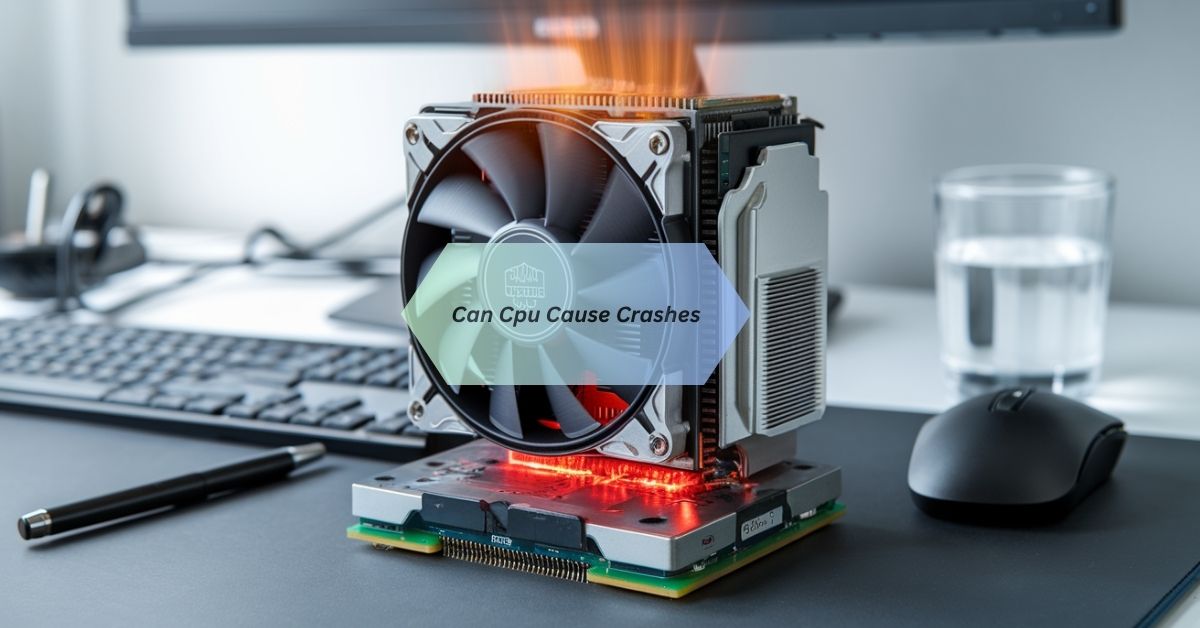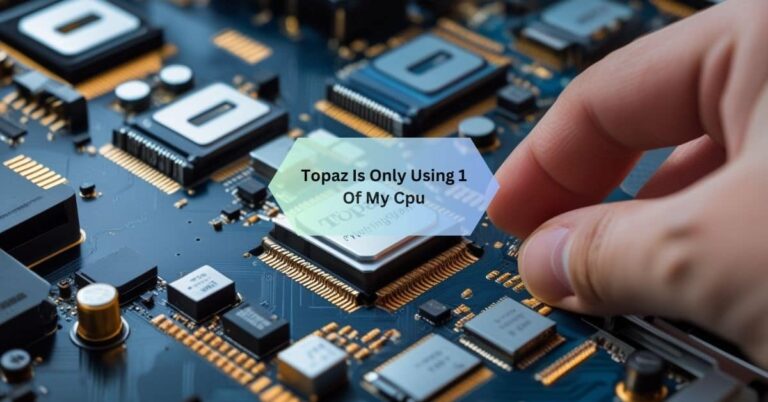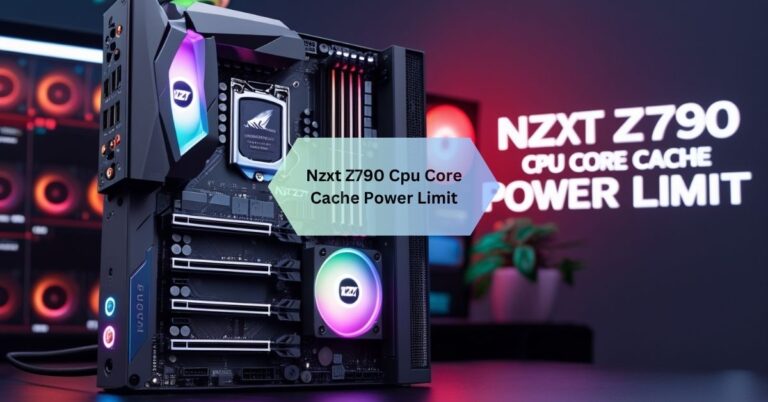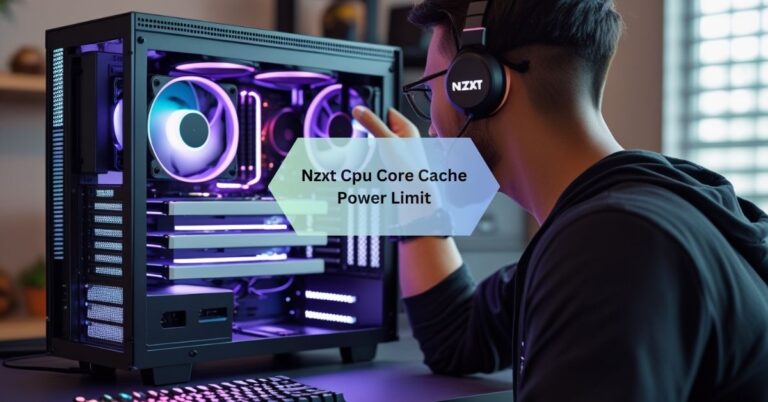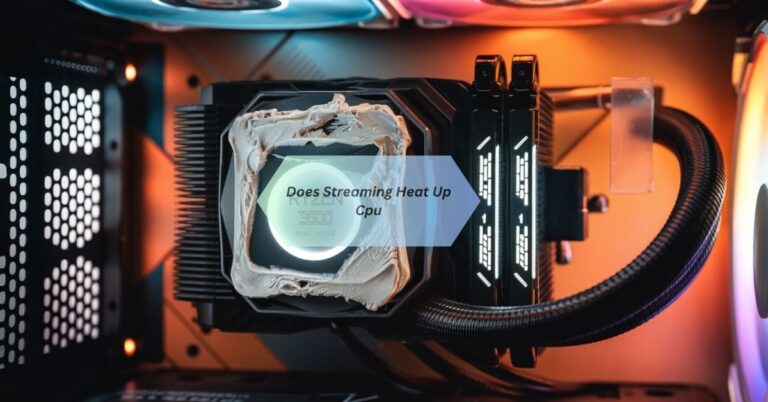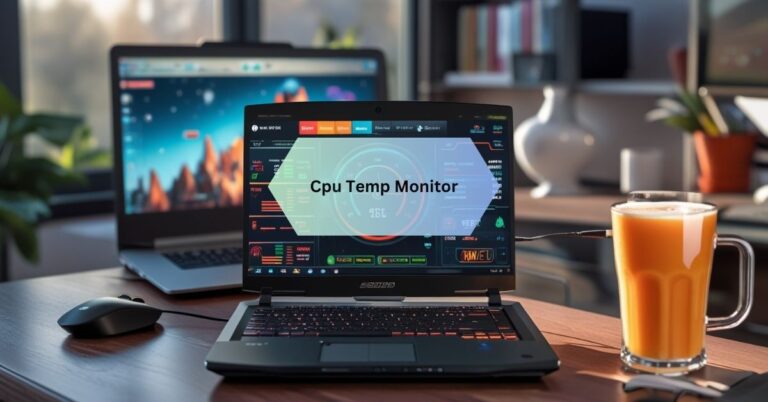Can Cpu Cause Crashes – How to Fix Overheating and Errors!
I once had random crashes on my PC, and after trying everything, I realized the CPU was overheating due to bad thermal paste. Replacing it fixed the issue, and now my computer runs perfectly.
Yes, a can cpu cause crashes if it overheats, is faulty, or improperly installed. Ensuring good cooling and proper setup can prevent these issues.
Stay tuned with us as we dive into the topic of can CPU cause crashes. We’ll explore common causes, troubleshooting tips, and how to keep your system running smoothly!
How Cpu Overheating Can Cause Crashes: Symptoms And Fixes!
Here’s how it happens and what you can do to fix it:
Why Overheating Causes Crashes
The CPU (Central Processing Unit) is the brain of your computer, handling all the tasks and calculations. If it gets too hot, it can’t work properly and might shut down to protect itself. This is often a built-in safety feature to avoid permanent damage.
Common Symptoms of Overheating
- Frequent Crashes: Your computer suddenly restarts or turns off, often during heavy tasks like gaming or video editing.
- Slow Performance: Before crashing, your PC might become unresponsive or laggy.
- Fan Noise: The cooling fans run louder than usual as they try to cool down the CPU.
- Error Messages: You might see a warning about overheating or thermal shutdowns.
- High Temperatures: Using a monitoring tool may show the CPU temperature exceeding safe limits (e.g., 70–90°C).
What Causes CPU Overheating?
- Poor Airflow: Dust buildup blocks the fans and vents.
- Faulty Cooling System: The CPU cooler might not be installed correctly or could be failing.
- Overclocking: Running the CPU beyond its limits without adequate cooling.
- High Ambient Temperature: A hot room makes it harder for the CPU to cool.
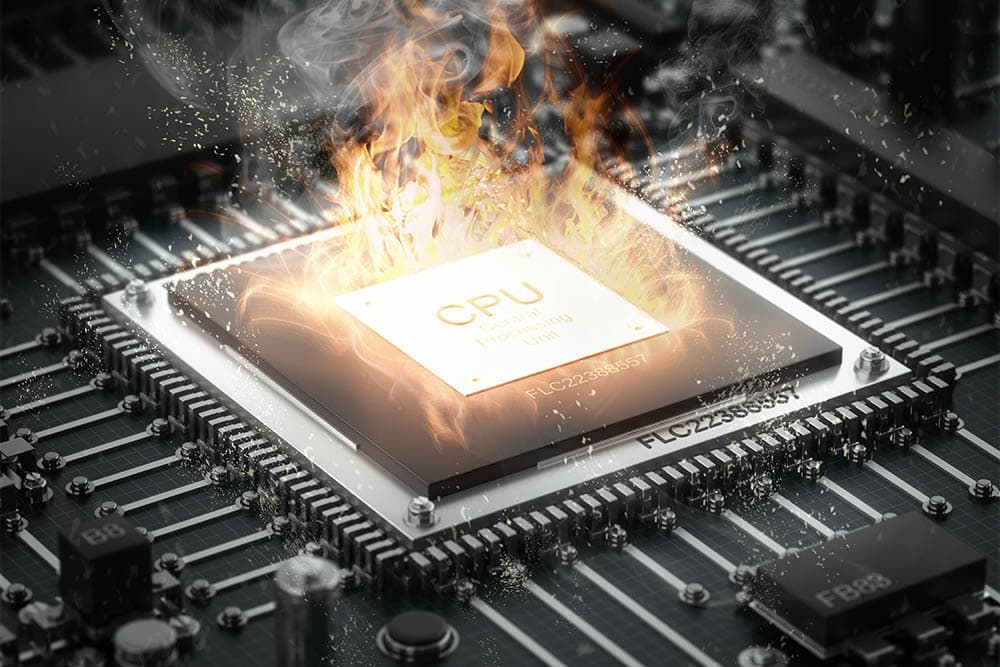
How to Fix and Prevent Overheating
- Clean Your PC: Remove dust from the fans, vents, and heatsinks with compressed air.
- Improve Airflow: Make sure the PC case is well-ventilated and the fans are working properly.
- Reapply Thermal Paste: Replace the thermal paste between the CPU and cooler for better heat transfer.
- Use Better Cooling: Upgrade to a more efficient CPU cooler or add extra fans.
- Avoid Overclocking: If you overclock, ensure proper cooling or revert to default settings.
- Monitor Temperatures: Use software like HWMonitor or Core Temp to keep an eye on CPU temperatures.
- Check Placement: Avoid placing the PC near heat sources or in tight, enclosed spaces.
When to Seek Professional Help
If the problem continues despite these fixes, there might be deeper hardware issues with your CPU or motherboard. In that case, consult a technician or consider replacing the CPU.
Also Read: Are odd cores on my cpu my non hyperthreaded cores – Full Guide Inside 2025!
Is Your Cpu Too Strong? Understanding Its Role In Crashing Games!
Here’s an in-depth look at the possible causes and solutions.
Can A Cpu Be Too Strong?
Technically, a CPU being “too strong” doesn’t directly cause crashes. However, some scenarios associated with powerful CPUs can lead to issues, including:
- System Bottlenecks:
- A very powerful CPU paired with a weaker GPU or outdated hardware can create a mismatch, leading to performance issues in games.
- The CPU processes faster than the GPU can handle, potentially causing stuttering or crashes in graphically intense games.
- Overclocking Instability:
- Many high-end CPUs are overclocked to push their performance limits.
- If the overclocking isn’t stable or adequately cooled, it can cause instability, leading to crashes.
- Compatibility Issues:
- Older games or poorly optimized software may not handle modern, multi-core CPUs well.
- Some games fail to use the CPU efficiently, leading to bugs, freezes, or crashes.
- Thermal Throttling:
- High-performance CPUs generate a lot of heat, especially during gaming.
- If cooling systems aren’t sufficient, the CPU can overheat and crash the game to protect itself.
How To Identify The Issue
- Monitor CPU and GPU Usage:
- Use tools like MSI Afterburner or HWMonitor to see if your CPU is being overutilized compared to your GPU during crashes.
- Check Temperatures:
- Monitor CPU temperatures during gaming to ensure they remain within safe limits (typically below 80°C for most CPUs).
- Inspect Game Requirements:
- Compare the game’s requirements with your system specs to identify potential mismatches.
- Review Crash Logs:
- Look at crash reports or logs (if available) to pinpoint whether the issue is CPU-related.
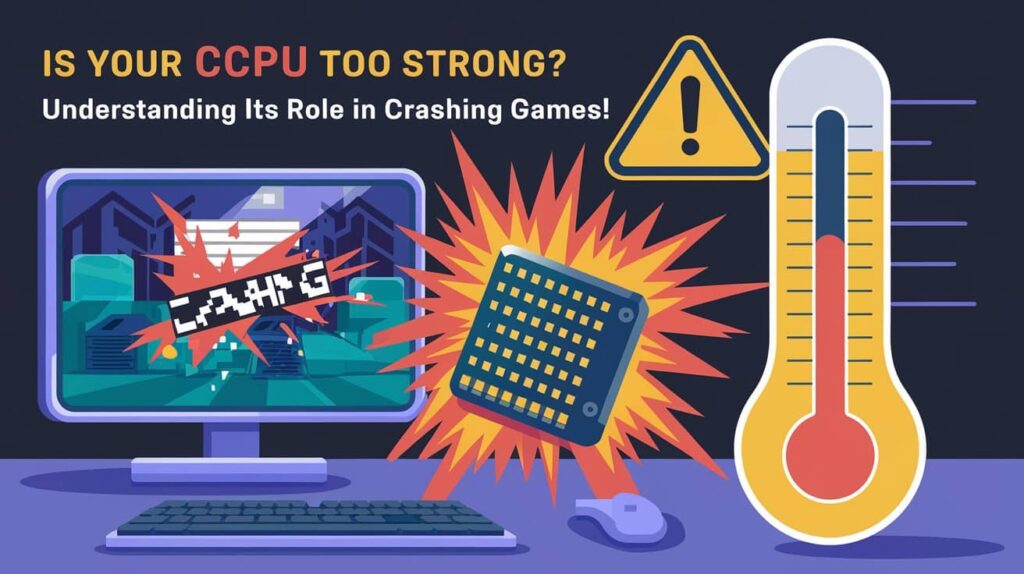
Fixes For Cpu-Related Game Crashes
- Optimize Game Settings:
- Lower graphics settings to reduce the workload on your system, ensuring smoother coordination between the CPU and GPU.
- Adjust Overclocking:
- If you’ve overclocked your CPU, try lowering the clock speed to ensure stability.
- Use stress-testing tools like Prime95 to test your overclock settings.
- Improve Cooling:
- Upgrade your CPU cooler or improve case ventilation to keep the CPU temperature in check.
- Reapply thermal paste for better heat transfer if overheating persists.
- Update Drivers and BIOS:
- Ensure all hardware drivers, especially for the CPU and GPU, are up to date.
- Update your motherboard’s BIOS to improve compatibility with your CPU.
- Cap FPS:
- Use in-game settings or external tools to cap the frame rate, reducing the CPU’s workload.
- Enable Game Compatibility Modes:
- For older games, use compatibility settings in Windows to optimize how the CPU handles the game.
When To Consider Hardware Upgrades
If crashes persist, it might indicate an unbalanced system. Consider upgrading your GPU to match your CPU’s performance, or look into a new power supply unit if power delivery is insufficient.
Also Read: Ambient Mode Not Works for CPU – Solutions You Need to Know!
Can A Faulty Cpu Cause Crashes? What You Need To Know!
Let’s explore how a faulty CPU can lead to crashes, how to identify the problem, and what you can do about it.
How A Faulty Cpu Can Cause Crashes
A CPU handles all the core processes of your computer. If it’s damaged or malfunctioning, it can create several issues:
- System Freezes and Crashes:
- A faulty CPU may stop processing tasks correctly, causing the system to freeze or crash unexpectedly.
- Random Restarts:
- Your computer might restart without warning because the CPU cannot handle operations efficiently.
- Blue Screen of Death (BSOD):
- On Windows systems, you might see error screens (BSOD) caused by a CPU error, often labeled as “hardware failure” or “machine check error.”
- Data Corruption:
- A malfunctioning CPU can process data incorrectly, leading to corrupted files or unstable programs.
- Failure to Boot:
- If the CPU is severely damaged, your computer might not start at all, showing error codes or staying on a blank screen.
What Causes A Cpu To Fail?
- Overheating:
- Without proper cooling, the CPU can overheat, causing internal damage over time.
- Electrical Issues:
- Power surges or an unstable power supply can damage the CPU.
- Physical Damage:
- Mishandling the CPU during installation or maintenance can lead to bent pins or other damage.
- Manufacturing Defects:
- Rarely, a CPU may be faulty from the factory.
- Overclocking:
- Running the CPU beyond its intended limits can lead to instability and long-term damage.
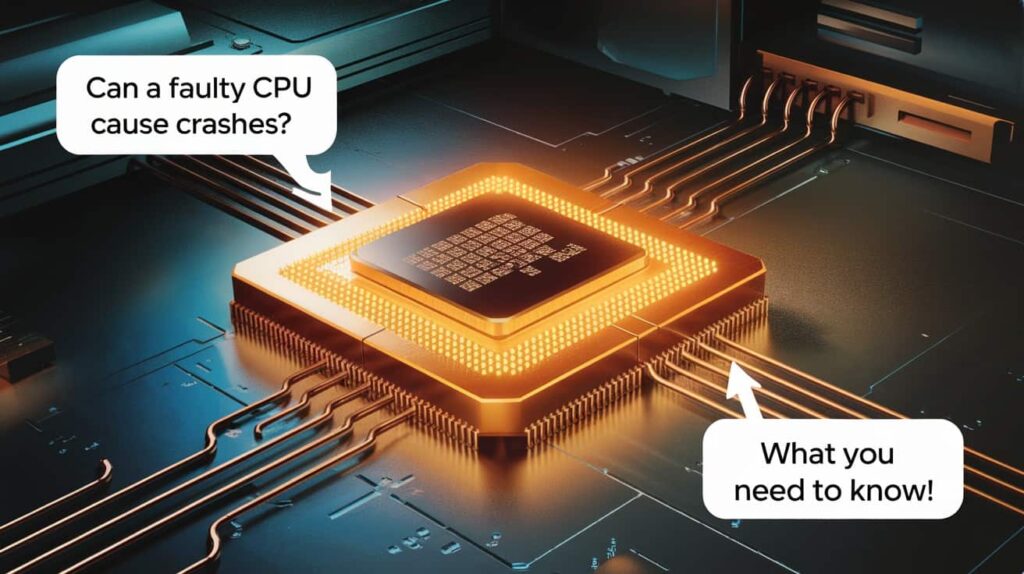
How To Identify A Faulty Cpu
- Stress Testing:
- Use tools like Prime95 or IntelBurnTest to check if the CPU crashes under heavy load.
- Monitor Temperatures:
- Check the CPU temperature using software like HWMonitor. If it overheats quickly, it may be damaged.
- Check for Error Codes:
- Look for specific error messages or codes in your system’s BIOS or event viewer logs.
- Swap Hardware:
- Test your system with another CPU (if available) to confirm if the CPU is the problem.
- Run Diagnostic Tools:
- Many motherboard manufacturers provide diagnostic tools to test CPU functionality.
What to Do If the CPU Is Faulty
- Check Warranty:
- If your CPU is still under warranty, contact the manufacturer for a replacement.
- Ensure Proper Cooling:
- Upgrade your cooling system or clean dust from your PC to prevent further damage.
- Reapply Thermal Paste:
- Reapply thermal paste between the CPU and cooler for better heat dissipation.
- Replace the CPU:
- If the CPU is confirmed faulty, you’ll need to purchase a new one compatible with your system.
- Inspect the Power Supply:
- Make sure your PSU is delivering stable power to avoid damaging the replacement CPU.
When to Seek Professional Help
If you’re unsure about diagnosing or replacing the CPU, it’s a good idea to take your computer to a professional technician. They can confirm the issue and ensure your hardware is properly handled.
Also Read: b75 motherboard what generation cpu – Complete Guide!
FAQS:
Can Cpu Cause Crashing?
Yes, a CPU can cause crashes if it overheats, is faulty, or unstable due to overclocking. Poor cooling or thermal paste issues can also trigger crashes. Keeping your CPU cool and stable is essential to avoid this problem.
How To Tell If A Cpu Is Causing Crashes?
Look for symptoms like frequent restarts, freezes, or a Blue Screen of Death (BSOD). High CPU temperatures or error logs mentioning hardware failure can indicate a CPU issue. Stress test your CPU using tools like Prime95 to confirm.
Can High Cpu Usage Cause Crashes?
Yes, if the CPU is pushed to 100% for too long, it can overheat and crash the system. This is more likely if your cooling system is weak or dust blocks airflow. Monitor usage with software like Task Manager and reduce unnecessary background tasks.
Can Cpu Cause Gpu To Crash?
An overheating or unstable CPU can indirectly cause GPU crashes, especially in tasks where both components work together. If the CPU can’t process data fast enough, it can lead to GPU errors. Ensuring proper cooling and compatibility between components helps avoid this.
Is My Cpu Crashing My Games?
If your games crash during high CPU usage or show stuttering before crashing, the CPU might be the cause. Overheating or insufficient performance for the game’s requirements can lead to crashes. Monitor your CPU’s temperature and usage while gaming to check.
Max Cpu Usage Causing Game To Crash – (I5 12400f / 3070ti)?
When the CPU is maxed out, it can overheat or fail to keep up with the GPU, leading to crashes. The i5 12400F is a capable CPU, but excessive background tasks or poor cooling can push it to its limits. Close unnecessary programs and ensure good airflow in your PC case.
Conclusion:
Yes, a can cpu cause crashes if it overheats, is overworked, or has hardware faults. Proper maintenance, like keeping the CPU cool and ensuring it is compatible with other components, is essential to prevent such issues. Regular monitoring and timely upgrades can help maintain system stability and avoid CPU-related crashes.
